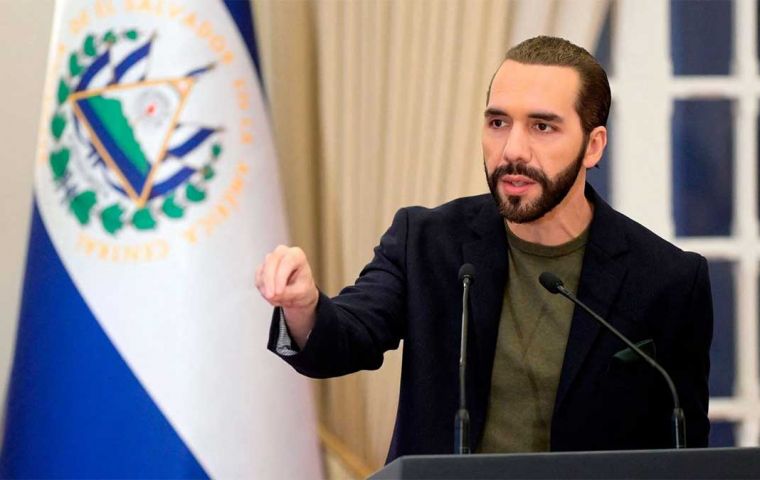MercoPress. South Atlantic News Agency
Indefinite reelection in El Salvador opens door to dictator in the making
 “You know what? I don't care if they call me a dictator,” Bukele said earlier this year
“You know what? I don't care if they call me a dictator,” Bukele said earlier this year Salvadoran President Nayib Bukele is anything but worried about being called a “dictator,” especially after 57 of his loyal lawmakers passed a reform in a 60-seat Congress approving his potential indefinite reelection, which critics view as the possible consolidation of an “autocratic” regime in the country.
Representative Marcela Villatoro argues that this change leads to an accumulation of power and weakens democracy, while Juanita Goebertus of Human Rights Watch has compared El Salvador's trajectory to that of Venezuela.
Bukele, who was reelected in 2024 with 85% of the vote, has been accused of human rights abuses, including the imprisonment of human rights activists and lawyers, as well as the arbitrary arrest and torture of thousands of people under a state of emergency established in 2022 to combat gangs. His critics also point to a culture of nepotism and a lack of accountability, but his supporters admire his success in reducing the homicide rate.
Despite the controversy, his popularity has grown beyond El Salvador's borders. Bukele, who is known for his casual style and heavy use of social media, where he has referred to himself as a “cool dictator,” has created a “cult phenomenon” around himself.
”The situation tonight is so serious that you don't realize what indefinite reelection brings: it brings accumulation of power and weakens democracy (...) there is corruption and patronage because it increases nepotism and slows down democracy and political participation,“ Villatoro argued. ”Democracy in El Salvador is dead!“
El Salvador is following ”the same path as Venezuela.“ ”It starts with a leader who uses his popularity to concentrate power, and ends in dictatorship,“ Goebertus wrote on social media.
The 44-year-old Law School dropout Bukele is proud to call US President Donald Trump his friend. ”You know what? I don't care if they call me a dictator,“ the president said on June 1 in his speech marking the first anniversary of his second term.
In March 2022, he established a state of emergency under which some 88,000 people have been arrested. Bukele has a plummeting homicide rate to show for everything and accuses those opposing him of defending gang members and being left-wing militants. On X, he calls himself a ”cool dictator“ and ”philosopher king,“ and mocks his critics.
Born on July 24, 1981, in San Salvador, he is the son of industrial chemist and representative of the Palestinian community Armando Bukele, who died in 2015, and Olga Ortez. As a child, ”he was always smiling, never seen desperate,“ architect Marleny Carranza, who worked in the Bukele companies, told AFP. In the school yearbook, he described himself as a ”class terrorist.”
He studied law at the Central American University but did not graduate, choosing instead to work from the age of 18 in his father's advertising agency, which ran campaigns for the left-wing Farabundo Martí National Liberation Front (FMLN, formerly a guerrilla group). During those years, he also managed a nightclub in San Salvador.
He began his political career in 2012 and, under the banner of the FMLN, served as mayor of the town of Nuevo Cuscatlán and of the Salvadoran capital from 2015 to 2018. Following an incident with a councilwoman, he was expelled from the party in 2017. Upon taking office, he said he did not consider himself “neither right-wing nor left-wing,” but later adopted a conservative stance and, this year, pledged his loyalty to Trump.
He rose to the pinnacle of power in 2019 by connecting with young people and those disappointed with the two parties that alternated in government after the civil war between 1980 and 1992.
Intolerant of criticism, he has a small circle of confidants that includes his brothers Karim, Yusef, and Ibrajim. His government includes former classmates from the bilingual school where he studied. He married Gabriela Rodríguez, a psychologist and ballet dancer, in 2014, and they have two daughters, Layla and Aminah.




Top Comments
Disclaimer & comment rulesCommenting for this story is now closed.
If you have a Facebook account, become a fan and comment on our Facebook Page!